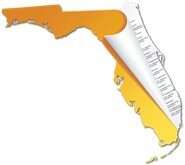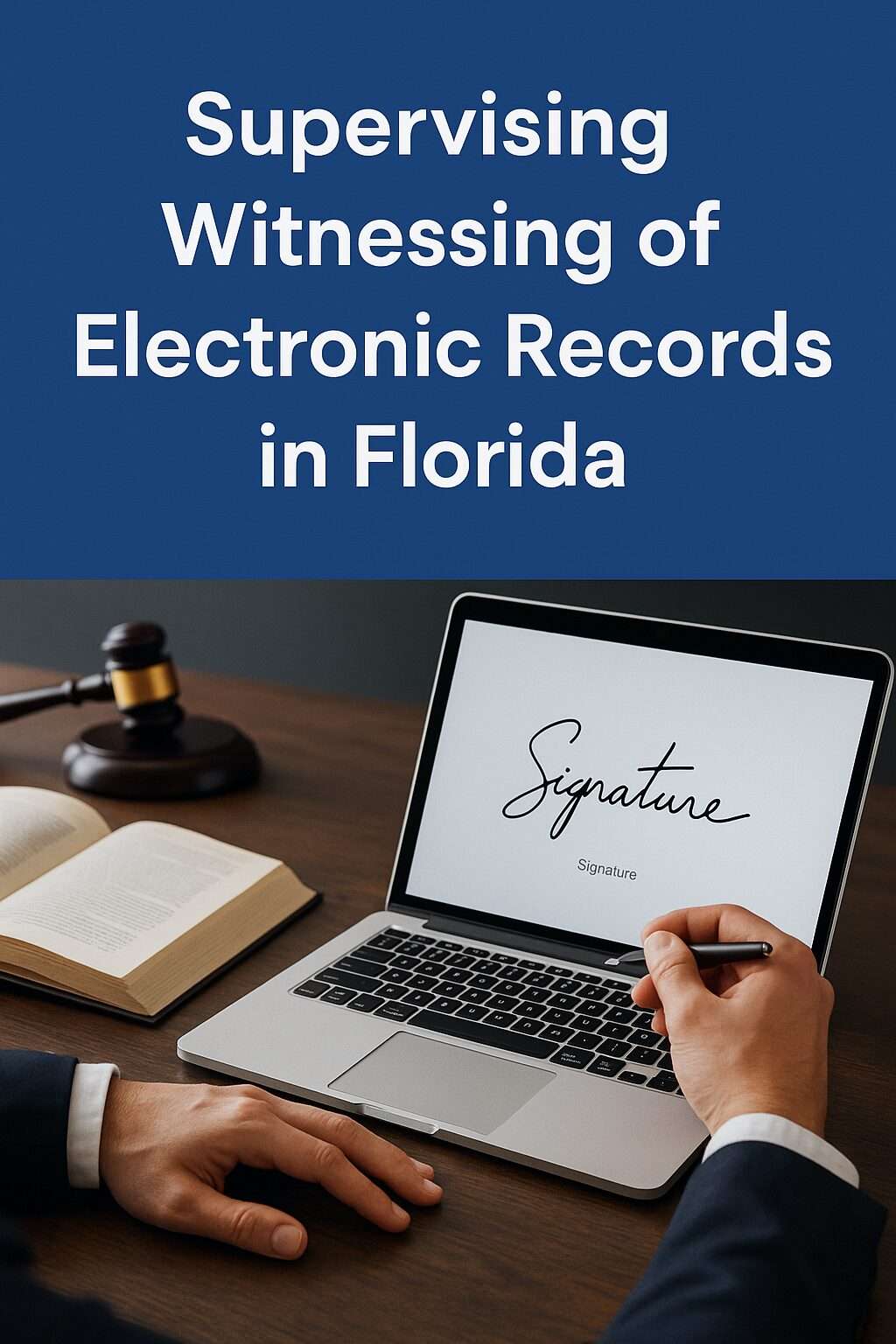Florida Remote Online Notary: Supervising Electronic Witnessing for Wills, Trusts & More
When most people think of notaries, they think of traditional acts—like verifying a signature in an acknowledgment or administering an oath in a jurat. In Florida, there’s another notarial act that’s just as official but far less familiar: supervising the witnessing of an electronic record.
Under Florida Statute § 117.285, this is a recognized notarial act, and it’s a big deal in the world of Remote Online Notarization (RON). It allows a Florida online notary to oversee document witnessing via secure, real-time audio-video technology—so the signer, the witnesses, and the notary don’t all have to be in the same physical location.
It’s a modern solution for a long-standing legal need, and it comes with its own specific rules, especially for certain high-value or sensitive documents.
What Does “Supervising the Witnessing of Electronic Records” Mean?
Simply put, when a document requires witnesses, a Florida remote online notary can supervise those witnesses electronically. This happens in a live video session where:
The principal (the person signing) is on camera.
Witnesses are either physically present with the principal or joining remotely via video.
The notary is overseeing the entire process and ensuring all the legal steps are followed.
If a witness is remote, their identity must be verified using the same secure, multi-step process required for online notarization under § 117.265(4). If a witness is physically present, they simply state their name and address on the video record so it becomes part of the permanent file.
When Is This Notarial Act Required?
While remote witnessing can be used for many documents, Florida law adds extra protections for certain sensitive or high-risk documents.
Documents That Require Special Procedures
If fewer than two witnesses are physically present with the signer, the supervising notary must follow additional screening and questioning steps for:
Wills (including electronic wills)
Trusts with testamentary provisions
Health-care advance directives
Spousal waivers under §§ 732.701 or 732.702
Powers of attorney granting banking or investment authority (§ 709.2208)
Special Safeguards for Sensitive Documents
When the document being signed is a will, trust with testamentary provisions, health-care advance directive, spousal waiver, or a power of attorney granting banking or investment authority, Florida law imposes extra steps before remote witnessing can happen.
Here’s the key detail most people miss: these safeguards are the responsibility of the Remote Online Notarization (RON) service provider — the “platform” — not the individual notary.
Platform Obligations
Under §117.285(5), the platform must:
Ask the three required screening questions before witnessing begins:
“Are you under the influence of any drug or alcohol today that impairs your ability to make decisions?”
“Do you have any physical or mental condition or long-term disability that impairs your ability to perform the normal activities of daily living?”
“Do you require assistance with daily care?”
End the session immediately if the signer answers “Yes” to any of these. Remote witnessing is not allowed in that case.
If all answers are “No,” present the statutory written warning before witnessing occurs:
NOTICE: If you are a vulnerable adult as defined in s. 415.102, Florida Statutes, the documents you are about to sign are not valid if witnessed by means of audio-video communication technology. If you suspect you may be a vulnerable adult, you should have witnesses physically present with you before signing.
Notary’s Optional Best Practice
Although the platform handles these safeguards, a well-trained online notary — like those at Florida Document Specialists — may repeat the questions and warning on camera so they’re part of the recorded session. This isn’t required, but it’s a smart way to strengthen the record if the document’s validity is ever challenged.
Why Platform Choice Matters
Not every RON platform is equipped for this process. If the platform can’t run the questions, display the warning, and automatically end a session when needed, the notarization will not meet Florida’s legal requirements — no matter how experienced the notary is.
Questions Asked During the Video Session
For sensitive documents covered by these safeguards, Florida law also requires certain on-camera questions during the signing. These are asked by the notary and captured in the recording:
Are you married? If so, what’s your spouse’s name?
Who helped you access this video conference?
Who helped prepare these documents?
Where are you right now?
Who else is in the room with you?
These responses are stored as part of the unedited audio-video record. They may be used as evidence if the document is ever challenged, although an incorrect answer alone doesn’t automatically invalidate the signing.
Why This Notarial Act Matters
When done correctly, supervised electronic witnessing through a compliant RON platform carries the same legal weight as traditional, in-person witnessing. That means a will signed in Florida with a witness in another state can still be valid — as long as every safeguard in §117.285 is followed.
For electronic wills, the law is crystal clear: supervision by a Florida online notary in compliance with §117.285 is mandatory for the will to be valid. Skipping any step — whether it’s a screening question, the statutory warning, or the proper identity verification — could leave the document open to challenge in court.
Risks of Getting It Wrong
A will or trust could be declared invalid.
A power of attorney might not be accepted by financial institutions.
A health-care directive could be unenforceable in a crisis.
In short — missing a safeguard is not just a minor mistake; it can undo the entire purpose of the document.
Quick Reference Table — Documents That Trigger Special Rules
| Document Type | Remote Witness Supervision Required if Less Than 2 Witnesses Physically Present? |
|---|---|
| Wills (including electronic) | ✅ Yes |
| Testamentary Trusts | ✅ Yes |
| Health-care Directives | ✅ Yes |
| Spousal Waivers (§732.701 / §732.702) | ✅ Yes |
| Powers of Attorney (banking/investment) | ✅ Yes |
How Florida Document Specialists Helps
At Florida Document Specialists, we handle remote online notarization every day — including supervising the witnessing of electronic records under the strict requirements of §117.285.
Our Compliance-First Process
We use only RON platforms that fully support the special supervised-witnessing workflow, including automated screening questions and session termination when needed.
We confirm the platform presents the statutory warning exactly as required.
When permitted, our notaries restate the questions and warning on video for extra protection.
We ensure remote witnesses complete the required identity verification and confirm U.S. or U.S. territory location.
If a safeguard fails, we stop the session and guide you toward proper in-person witnessing.
Ready to Do It Right the First Time?
Sensitive documents deserve the right platform, the right workflow, and the right notary. Florida Document Specialists delivers all three.
Call us today at (800) 255-5287 or schedule your compliant supervised electronic witnessing session — and sign with confidence.

